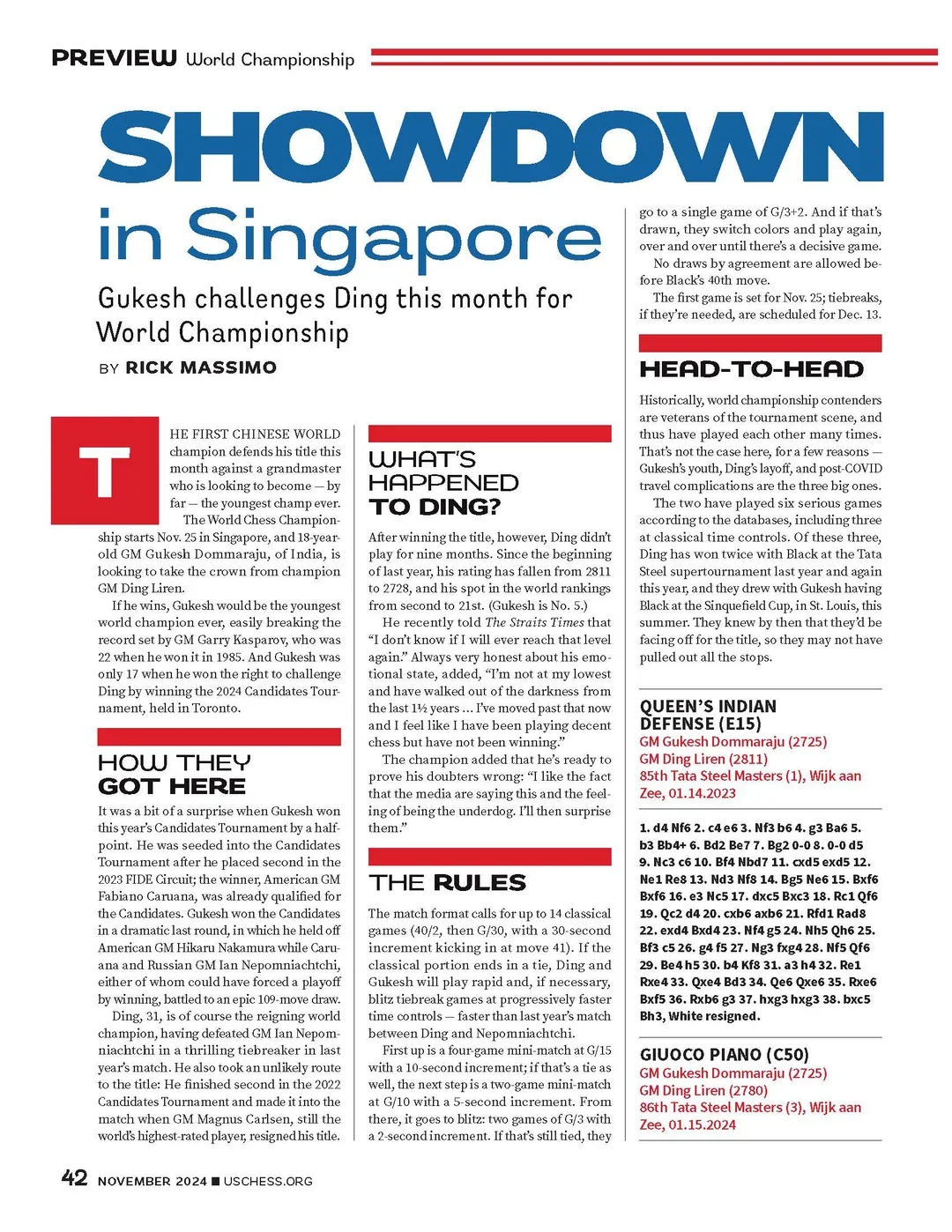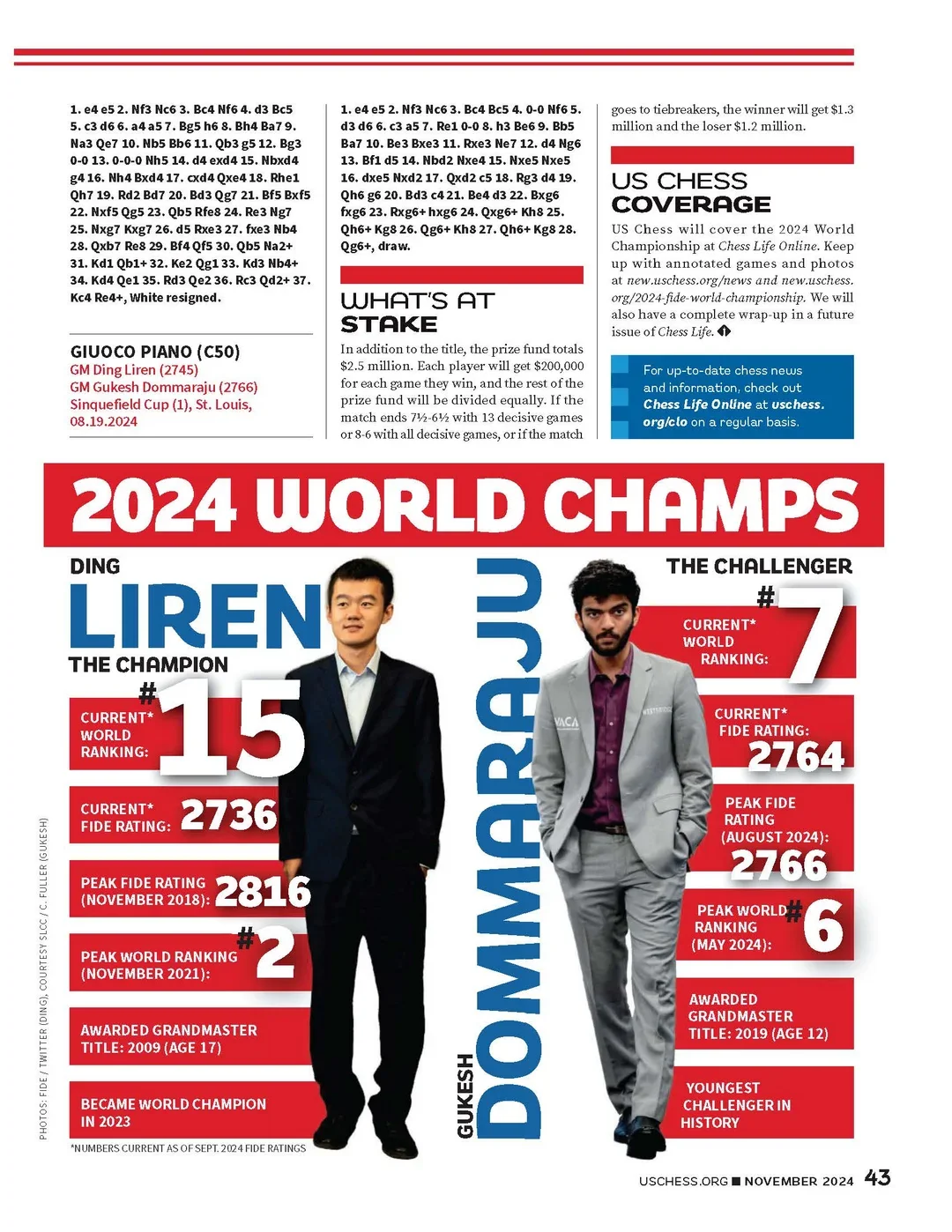Editor's note: This story first appeared in the November 2024 issue of Chess Life. Consider becoming a US Chess member for more content like this — access to digital editions of both Chess Life and Chess Life Kids is a member benefit, and you can receive print editions of both magazines for a small add-on fee.
We also provide a pdf version of the article for those interested in reading it in full layout.
The first Chinese world champion defends his title this month against a grandmaster who is looking to become — by far — the youngest champ ever.
The World Chess Championship starts Nov. 25 in Singapore, and 18-year-old GM Gukesh Dommaraju, of India, is looking to take the crown from champion GM Ding Liren.
If he wins, Gukesh would be the youngest world champion ever, easily breaking the record set by GM Garry Kasparov, who was 22 when he won it in 1985. And Gukesh was only 17 when he won the right to challenge Ding by winning the 2024 Candidates Tournament, held in Toronto.
How they got here
It was a bit of a surprise when Gukesh won this year’s Candidates Tournament by a half-point. He was seeded into the Candidates Tournament after he placed second in the 2023 FIDE Circuit; the winner, American GM Fabiano Caruana, was already qualified for the Candidates. Gukesh won the Candidates in a dramatic last round, in which he held off American GM Hikaru Nakamura while Caruana and Russian GM Ian Nepomniachtchi, either of whom could have forced a playoff by winning, battled to an epic 109-move draw.
Ding, 31, is of course the reigning world champion, having defeated GM Ian Nepomniachtchi in a thrilling tiebreaker in last year’s match. He also took an unlikely route to the title: He finished second in the 2022 Candidates Tournament and made it into the match when GM Magnus Carlsen, still the world’s highest-rated player, resigned his title.
What’s happened to Ding?
After winning the title, however, Ding didn’t play for nine months. Since the beginning of last year, his rating has fallen from 2811 to 2728, and his spot in the world rankings from second to 22nd (on the live rankings). Gukesh, meanwhile, started the year in the 25th spot on the official ratings list, and is now up to number five.
Ding recently told The Straits Times that “I don’t know if I will ever reach that level again.” Always very honest about his emotional state, he added, “I’m not at my lowest and have walked out of the darkness from the last 1½ years … I’ve moved past that now and I feel like I have been playing decent chess but have not been winning.”
The champion added that he’s ready to prove his doubters wrong: “I like the fact that the media are saying this and the feeling of being the underdog. I’ll then surprise them.”
The Rules
The match format calls for up to 14 classical games (40/2, then G/30, with a 30-second increment kicking in at move 41). If the classical portion ends in a tie, Ding and Gukesh will play rapid and, if necessary, blitz tiebreak games at progressively faster time controls — faster than last year’s match between Ding and Nepomniachtchi.
First up is a four-game mini-match at G/15 with a 10-second increment; if that’s a tie as well, the next step is a two-game mini-match at G/10 with a 5-second increment. From there, it goes to blitz: two games of G/3 with a 2-second increment. If that’s still tied, they go to a single game of G/3+2. And if that’s drawn, they switch colors and play again, over and over until there’s a decisive game.
No draws by agreement are allowed before Black’s 40th move.
The first game is set for Monday, Nov. 25; tiebreaks, if they’re needed, are scheduled for Dec. 13.
Head-to-head
Historically, world championship contenders are veterans of the tournament scene, and thus have played each other many times. That’s not the case here, for a few reasons — Gukesh’s youth, Ding’s layoff, and post-COVID travel complications are the three big ones.
The two have played six serious games according to the databases, including three at classical time controls. Of these three, Ding has won twice as Black at the Tata Steel super-tournament (last year and again this year), and he drew with Gukesh as Black at this summer’s Sinquefield Cup, in St. Louis. They knew by then that they’d be facing off for the title, so they may not have pulled out all the stops. Below are both of Ding's victories and their most recent draw:
What’s at Stake
In addition to the title, the prize fund totals $2.5 million. Each player will get $200,000 for each game they win, and the rest of the prize fund will be divided equally. If the match ends 7½–6½ with 13 decisive games or 8–6 with all decisive games, or if the match goes to tiebreakers, the winner will get $1.3 million and the loser $1.2 million.
US Chess Coverage
US Chess will cover the 2024 World Championship at Chess Life Online. With games beginning at 3 a.m. EST, we will likely have reports and game annotations up by mid-afternoon of that day. We will also share printable bulletins throughout the match. Annotators include GM Joel Benjamin, IM John Watson, IM Robert Shlyakhtenko, and WGM Tatev Abrahamyan.
Keep up with annotated games and photos from our daily reports here. We will also have a complete wrap-up in a future issue of Chess Life.
What’s Your Prediction?
Our own Bryan Tillis solicited the predictions from a number of top players for the video below. Who you got? Add your own predictions in the comments!
Categories
Archives
- December 2025 (24)
- November 2025 (29)
- October 2025 (39)
- September 2025 (27)
- August 2025 (29)
- July 2025 (43)
- June 2025 (25)
- May 2025 (24)
- April 2025 (29)
- March 2025 (29)
- February 2025 (20)
- January 2025 (24)
- December 2024 (34)
- November 2024 (18)
- October 2024 (35)
- September 2024 (23)
- August 2024 (27)
- July 2024 (44)
- June 2024 (27)
- May 2024 (31)
- April 2024 (51)
- March 2024 (34)
- February 2024 (25)
- January 2024 (26)
- December 2023 (29)
- November 2023 (26)
- October 2023 (37)
- September 2023 (27)
- August 2023 (37)
- July 2023 (47)
- June 2023 (33)
- May 2023 (37)
- April 2023 (45)
- March 2023 (37)
- February 2023 (28)
- January 2023 (31)
- December 2022 (23)
- November 2022 (32)
- October 2022 (31)
- September 2022 (19)
- August 2022 (39)
- July 2022 (32)
- June 2022 (35)
- May 2022 (21)
- April 2022 (31)
- March 2022 (33)
- February 2022 (21)
- January 2022 (27)
- December 2021 (36)
- November 2021 (34)
- October 2021 (25)
- September 2021 (25)
- August 2021 (41)
- July 2021 (36)
- June 2021 (29)
- May 2021 (29)
- April 2021 (31)
- March 2021 (33)
- February 2021 (28)
- January 2021 (29)
- December 2020 (38)
- November 2020 (40)
- October 2020 (41)
- September 2020 (35)
- August 2020 (38)
- July 2020 (36)
- June 2020 (46)
- May 2020 (42)
- April 2020 (37)
- March 2020 (60)
- February 2020 (38)
- January 2020 (45)
- December 2019 (34)
- November 2019 (35)
- October 2019 (42)
- September 2019 (45)
- August 2019 (56)
- July 2019 (44)
- June 2019 (35)
- May 2019 (40)
- April 2019 (48)
- March 2019 (61)
- February 2019 (39)
- January 2019 (30)
- December 2018 (29)
- November 2018 (51)
- October 2018 (45)
- September 2018 (29)
- August 2018 (49)
- July 2018 (35)
- June 2018 (31)
- May 2018 (39)
- April 2018 (31)
- March 2018 (26)
- February 2018 (33)
- January 2018 (30)
- December 2017 (26)
- November 2017 (24)
- October 2017 (30)
- September 2017 (30)
- August 2017 (31)
- July 2017 (28)
- June 2017 (32)
- May 2017 (26)
- April 2017 (37)
- March 2017 (28)
- February 2017 (30)
- January 2017 (27)
- December 2016 (29)
- November 2016 (24)
- October 2016 (32)
- September 2016 (31)
- August 2016 (27)
- July 2016 (24)
- June 2016 (26)
- May 2016 (19)
- April 2016 (30)
- March 2016 (36)
- February 2016 (28)
- January 2016 (32)
- December 2015 (26)
- November 2015 (23)
- October 2015 (16)
- September 2015 (28)
- August 2015 (28)
- July 2015 (6)
- June 2015 (1)
- May 2015 (2)
- April 2015 (1)
- February 2015 (3)
- January 2015 (1)
- December 2014 (1)
- July 2010 (1)
- October 1991 (1)
- August 1989 (1)
- January 1988 (1)
- December 1983 (1)









